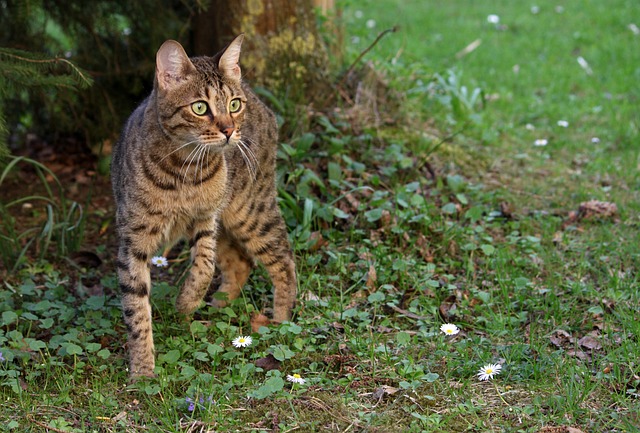When it comes to neutering a male Bengal cat, there are a few things you should consider before making a decision. In this article, we’ll explore some of the critical factors involved in the decision-making process and offer our advice on when is the best time to have the surgery performed.
To answer this question, there are several factors to depend on, including your cat’s age, health, and behavior.
In general, most male cats can be safely neutered at around six months of age. Yet, there are some exceptions. For example, if your cat is particularly large or aggressive, your vet may recommend waiting until he is a bit older.
Additionally, if your cat has any health concerns that complicate surgery, it is best to wait until he is fully grown before having the procedure done.
When Do Bengal Cats Go Into Heat?
The first heat usually occurs when the Bengal cat is around six months old. However, some Bengals may go into heat as early as four months old, while others may not experience their first heat until they are a year old.
Once a Bengal cat goes into heat, she will cycle through periods of estrus (when she is receptive to mating) and dioestrus (when she is not receptive to mating).
Each estrus cycle lasts about three weeks, and a Bengal cat typically has two or three estrus cycles per year.
What Are the Benefits of Neutering a Bengal Cat?
There are several benefits to neutering a Bengal cat, including the following:
– Reduced risk of certain types of cancer, such as testicular cancer.
– Reduced risk of prostate problems.
– Reduced risk of roaming and fighting.
– Reduced risk of urine spraying.
– Increased lifespan (neutered cats typically live longer than unneutered cats).
Of course, there are also some potential downsides to neutering a Bengal cat, such as:
– Recovery from surgery can be somewhat uncomfortable for the cat.
– A small risk of complications from surgery, such as bleeding or infection.
– Neutered cats may gain weight more easily than unneutered cats.
Ultimately, the decision of whether or not to neuter a Bengal cat is personal. However, some Bengal owners choose to neuter their cats to prevent unwanted litter.
In contrast, others prefer not to neuter their cats because they feel it is unnecessary or because they are concerned about the potential risks and side effects of surgery.
When Is It Too Late To Neuter My Bengal Cat?
There is no definitive answer to this question, as each cat is an individual and will respond differently to surgery at different ages. However, it is generally safe to neuter a Bengal cat up until he is around two years old.
After that age, there is an increased risk of complications from surgery, such as bleeding or infection. Therefore, if you are considering neutering your Bengal cat, it is best to do so before he reaches the age of two.
How Much Does It Cost To Neuter A Bengal Cat?
The cost of neutering a Bengal cat will vary depending on the veterinarian you use and where you live. In general, however, the average cost of neutering a Bengal cat ranges from $50 to $200.
How Do I Prepare My Bengal Cat For Surgery?
If you have decided to neuter your Bengal cat, there are a few things you can do to help him prepare for surgery:
– Schedule an appointment with your veterinarian and make sure he is up to date on his vaccinations.
– Stop feeding your Bengal cat food or treats at least 12 hours before surgery. This will help prevent vomiting during or after the procedure.
– Provide your Bengal cat with a quiet, comfortable place to rest and recover after surgery. This may be a small room or crate lined with blankets or towels.
– Talk to your veterinarian about any concerns or questions you have about the surgery.
By taking these steps, you can help your Bengal cat feel more comfortable and safe during and after his surgery.
What Are the Risks of Not Neutering a Bengal Cat?
If you choose not to neuter your Bengal cat, there are a few things to be aware of. First, many risks are associated with not neutering a Bengal cat. These include, but are not limited to:
– He may roam and fight with other cats, which can lead to injuries or even death.
– He may urine spray to mark his territory. This can be extremely difficult to clean up and may make your home smell unpleasant.
– He may develop certain types of cancer, such as testicular cancer if he is not neutered.
– He may develop prostate problems if he is not neutered.
By keeping these risks in mind, you can help decide whether or not to neuter your Bengal cat.
When it comes to neutering a Bengal cat, there are pros and cons to consider. On the one hand, neutering a Bengal cat can have many benefits, such as reducing the risk of cancer or other health problems, decreasing the chance of roaming and fighting, and helping to keep your home clean.
On the other hand, surgery can be uncomfortable for cats, and there is always a small risk of complications.
Ultimately, the decision whether or not to neuter a Bengal cat is up to his owner. Some people choose to neuter their cats for health reasons, while others opt not to neuter their cats due to possible risks and side effects of surgery.
Owners must weigh all the pros and cons before deciding on this critical surgery.














